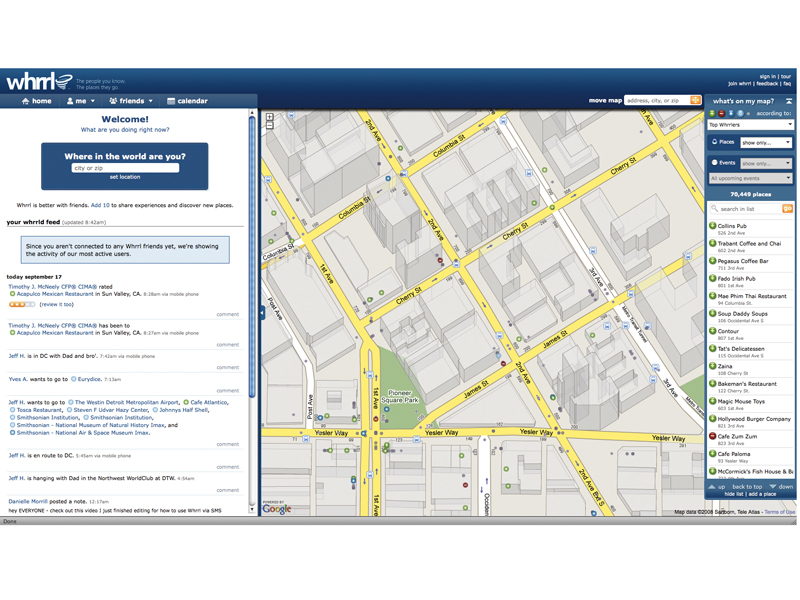Social networking apps go location-aware
Discover the apps that overlay social data on the real world

In September 2008, jaws dropped at the TechCrunch 50 conference.
The reason was the Sekai Camera, an iPhone application that takes the view from the phone's camera and augments it with data overlays including user-generated content.
Could this be the future of social apps?
Er, probably not. The demo was eye-popping, but details are frustratingly thin on the ground.
Developer Tonchidot won't say what technology it uses, although it does say image recognition isn't part of the system, and its promise of integrating information from other Sekai Camera users, Tonchidot itself and other web services is rather vague.
If it's real it could be the mobile internet's killer app; but then again, it could end up being the mobile equivalent of Duke Nukem Forever.
What's interesting isn't the app itself, though. It's that instead of dismissing it, people wanted to know the nuts and bolts of how it works. We might not be overlaying social data on the real world just yet, but we're not far off it.
Get daily insight, inspiration and deals in your inbox
Sign up for breaking news, reviews, opinion, top tech deals, and more.
Location, location
Location-aware social apps have been around for a while, but the iPhone hype has given them a new lease of life. The iTunes App Store is stuffed with them. nrme is a kind of location-aware Twitter.
iCloseBy connects you to people sharing the same wireless network. Now! GeoNetworking is designed to post information or requests for others to pick up. Loopt is a kind of Facebook that knows where everybody is. The list goes on, and there's a similarly long one for Google's Android.
The renewed interest in location awareness is partly due to the increasing popularity of GPS-enabled mobile phones such as the iPhone, and high-end Nokia and Blackberry offerings. However, GPS isn't a prerequisite for location-based applications to work. Google's My Location service offers near-GPS accuracy for phones without GPS chips, and inevitably they've stuck it in Gears for developers to play with.
One of the most interesting location-aware applications is Whrrl. It's best described as a social mapping service (Mashable describes it as "Yelp plus Twitter"), enabling you to find places or events based on your contacts' locations, recommendations or interests. Currently in beta, it's available for 17 US cities and works on PCs and smartphones.
What makes Whrrl different from many location-based services is that it has a smart business model. CEO Jeff Holden believes "foot-streaming" – that is, recording location data to deliver Amazon-style 'people who did this also do that' recommendations to the physical world – could revolutionise advertising. Holden wants to target the small businesses that normally advertise in the Yellow Pages or the local paper by helping them target competitors' customers, and its location data will show whether the promotions actually worked.
Impressive? Investors certainly think so. Whrrl has attracted heavyweight financial backing and it was also the first service to be backed by the iFund, an Apple-sponsored fund to boost iPhone development. However, like any new social app, Whrrl suffers from the "only fax machine in the world" problem: if you've got the only one, who's going to send you faxes? What use is a new social network if everybody is on a different one?
Eagle eyed
One of the most elegant solutions to this problem, for location-based applications at least, is Yahoo!'s Fire Eagle. By sending your location data to Fire Eagle, you can then cascade it to any Fire Eagleenabled service – so it's as easy to update 20 services as it is to update one. Crucially, you can tailor your information on a per-app basis – so a "what's near me?" app would get your precise location, while your friends on a social network might only know what region or country you're in.
Writer, broadcaster, musician and kitchen gadget obsessive Carrie Marshall has been writing about tech since 1998, contributing sage advice and odd opinions to all kinds of magazines and websites as well as writing more than a dozen books. Her memoir, Carrie Kills A Man, is on sale now and her next book, about pop music, is out in 2025. She is the singer in Glaswegian rock band Unquiet Mind.
